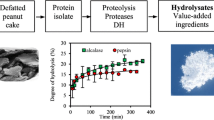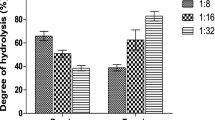Abstract
Because of health concerns regarding synthetic antioxidants, natural antioxidant compounds are being considered by scientists. Bioactive peptides have been shown to have various physiological functions, such as antioxidative activity. Pomegranate seed protein, the by-product of the pomegranate seed oil industry, can be a good source of bioactive peptides. The optimum conditions for enzymatic hydrolysis of pomegranate seed protein with alcalase were determined using a response surface methodology. The influence of different temperatures (45–55 °C), times (30–180 min), and enzyme to substrate (E/S) ratio (1–3% w/w) on DPPH scavenging power and ferric reducing activity as the responses, were studied. Also, the degree of hydrolysis and the surface hydrophobicity of samples were determined. Moreover, using scanning electron microscopy and electrophoresis technique, microscopic structure and molecular weight of hydrolysate, were studied respectively. Alcalase-derived hydrolysates showed a DPPH scavenging activity (88 ± 0.97%) and ferric reducing power (0.5 ± 0.83) at optimum conditions of hydrolysis (48.8 °C, 97.5 min, E/S ratio 1.3%w/w). The degree of hydrolysis coincided with 36 ± 1.2%. An increase in the surface hydrophobicity of the protein during hydrolysis confirmed the unfolding of the pomegranate seed protein structure. The presence of low-molecular-weight peptides was evidenced by the electrophoresis technique. As well as the SEM showed that protein fragments had been reduced to small sizes following enzymatic treatments. According to the results of this study, pomegranate seed protein hydrolysate can be considered a suitable source of antioxidants with an aggregate market value in food formulations.




Similar content being viewed by others
References
Akbarbaglu Z, Mahdi Jafari S, Sarabandi K et al (2019) Influence of spray drying encapsulation on the retention of antioxidant properties and microstructure of flaxseed protein hydrolysates. Colloids Surf B 178:421–429. https://doi.org/10.1016/j.colsurfb.2019.03.038
Aluko RE (2015) Structure and function of plant protein-derived antihypertensive peptides. Curr Opin Food Sci 4:44–50. https://doi.org/10.1016/j.cofs.2015.05.002
Azizi Khesal M, Sharifan A, Hoseini E, Ghavami A (2020) Optimization of enzymatic hydrolysis conditions of Caspian kutum (Rutilus frisii kutum)ˮ by-product for production of bioactive peptides with antioxidative properties. Int J Pept Res Ther 26:1829–1838. https://doi.org/10.1007/s10989-019-09981-6
Bradford MM (1976) A rapid and sensitive method for the quantitation of microgram quantities of protein utilizing the principle of protein-dye binding. Anal Biochem 72:248–254
Chalamaiah M, Yu W, Wu J (2018) Immunomodulatory and anticancer protein hydrolysates (peptides) from food proteins: a review. Food Chem 245:205–222. https://doi.org/10.1016/J.FOODCHEM.2017.10.087
Cotabarren J, Rosso AM, Tellechea M et al (2019) Adding value to the chia (Salvia hispanica L.) expeller: production of bioactive peptides with antioxidant properties by enzymatic hydrolysis with Papain. Food Chem 274:848–856. https://doi.org/10.1016/j.foodchem.2018.09.061
Derakhshan Z, Ferrante M, Tadi M et al (2018) Antioxidant activity and total phenolic content of ethanolic extract of pomegranate peels, juice and seeds. Food Chem Toxicol. https://doi.org/10.1016/j.fct.2018.02.023
Fang X, Xie N, Chen X et al (2012) Optimization of antioxidant hydrolysate production from flying squid muscle protein using response surface methodology. Food Bioprod Process 90:676–682. https://doi.org/10.1016/j.fbp.2012.04.001
Fathi M, Hosseini FS, Rashidi L (2022) Optimized enzymatic hydrolysis of olive pomace proteins using response surface methodology. Appl Food Biotechnol 9:79–90. https://doi.org/10.22037/afb.v9i2.36192
Gerzhova A, Mondor M, Benali M, Aider M (2016) Study of total dry matter and protein extraction from canola meal as affected by the pH, salt addition and use of zeta-potential/turbidimetry analysis to optimize the extraction conditions. Food Chem 201:243–252. https://doi.org/10.1016/j.foodchem.2016.01.074
Hamzeh A, Rezaei M, Khodabandeh S et al (2019) Optimization of antioxidant peptides production from the mantle of cuttlefish (Sepia pharaonis) using RSM and fractionation. J Aquat Food Prod Technol 28:392–401. https://doi.org/10.1080/10498850.2019.1594480
Hernández-Corroto E, Plaza M, Marina ML, García MC (2020) Sustainable extraction of proteins and bioactive substances from pomegranate peel (Punica granatum L.) using pressurized liquids and deep eutectic solvents. Innov Food Sci Emerg Technol 60:102314. https://doi.org/10.1016/J.IFSET.2020.102314
Homayouni-Tabrizi M, Asoodeh A, Soltani M (2017) Cytotoxic and antioxidant capacity of camel milk peptides: effects of isolated peptide on superoxide dismutase and catalase gene expression. J Food Drug Anal 25:567–575. https://doi.org/10.1016/j.jfda.2016.10.014
Hoyle NT, Merritt JH (1994) Quality of fish protein hydrolysates from herring (Clupea harengus). J Food Sci 59:76–79. https://doi.org/10.1111/J.1365-2621.1994.TB06901.X
Islam MS, Hongxin W, Admassu H et al (2021) Degree of hydrolysis, functional and antioxidant properties of protein hydrolysates from Grass Turtle (Chinemys reevesii) as influenced by enzymatic hydrolysis conditions. Food Sci Nutr 9:4031–4047. https://doi.org/10.1002/fsn3.1903
Kandylis P, Kokkinomagoulos E (2020) Food applications and potential health benefits of pomegranate and its derivatives. Foods. https://doi.org/10.3390/foods9020122
Kato A, Nakai S (1980) Hydrophobicity determined by a fluorescence probe. Biochim Biophys Acta 624:13–20
Kurozawa LE, Park KJ, Hubinger MD (2008) Optimization of the enzymatic hydrolysis of chicken meat using response surface methodology. J Food Sci. https://doi.org/10.1111/j.1750-3841.2008.00765.x
Laemmli UK (1970) Cleavage of structural proteins during the assembly of the head of bacteriophage T4. Nature 227:680–685. https://doi.org/10.1038/227680a0
Maluf JU, Fiorese ML, Maestre KL et al (2020) Optimization of the porcine liver enzymatic hydrolysis conditions. J Food Process Eng. https://doi.org/10.1111/jfpe.13370
Meshginfar N, Sadeghi A, Farah M, Tsopmo A (2018) Physicochemical, antioxidant, calcium binding, and angiotensin converting enzyme inhibitory properties of hydrolyzed tomato seed proteins. J Food Biochem. https://doi.org/10.1111/jfbc.12721
Mirzapour M, Rezaei K, Sentandreu MA, Moosavi-movahedi AA (2016) In vitro antioxidant activities of hydrolysates obtained from Iranian wild almond (Amygdalus scoparia) protein by several enzymes. Int J Food Sci Technol 51:609–616. https://doi.org/10.1111/ijfs.12996
Nioi C, Kapel R, Rondags E, Marc I (2012) Selective extraction, structural characterisation and antifungal activity assessment of napins from an industrial rapeseed meal. Food Chem 134:2149–2155. https://doi.org/10.1016/j.foodchem.2012.04.017
Olivares-Galván S, Marina ML, García MC (2020) Extraction and characterization of antioxidant peptides from fruit residues. Foods 9:1018. https://doi.org/10.3390/FOODS9081018
Ozgen M, Durgaç C, Serçe S, Kaya C (2008) Chemical and antioxidant properties of pomegranate cultivars grown in the Mediterranean region of Turkey. Food Chem 111:703–706. https://doi.org/10.1016/j.foodchem.2008.04.043
Saad AM, Osman AOM, Mohamed AS, Ramadan MF (2020) Enzymatic hydrolysis of Phaseolus vulgaris protein isolate: characterization of hydrolysates and effect on the quality of minced beef during cold storage. Int J Pept Res Ther 26:567–577. https://doi.org/10.1007/s10989-019-09863-x
Seo H, Jung E, Go G et al (2015) Optimization of hydrolysis conditions for bovine plasma protein using response surface methodology. Food Chem. https://doi.org/10.1016/j.foodchem.2015.03.133
Sierra-Lopera LM, Zapata-Montoya JE (2021) Optimization of enzymatic hydrolysis of red tilapia scales (Oreochromis sp.) to obtain bioactive peptides. Biotechnol Rep 30:e00611. https://doi.org/10.1016/j.btre.2021.e00611
Singh TP, Siddiqi RA, Sogi DS (2018) Statistical optimization of enzymatic hydrolysis of rice bran protein concentrate for enhanced hydrolysate production by papain. LWT Food Sci Technol. https://doi.org/10.1016/j.lwt.2018.09.014
Tehranifar A, Zarei M, Nemati Z et al (2010) Investigation of physico-chemical properties and antioxidant activity of twenty Iranian pomegranate (Punica granatum L.) cultivars. Sci Hortic (Amsterdam) 126:180–185. https://doi.org/10.1016/j.scienta.2010.07.001
Teshnizi ZM, Robatjazi SM, Mosaabadi JM (2020) Optimization of the enzymatic hydrolysis of poultry slaughterhouse wastes using alcalase enzyme for the preparation of protein hydrolysates. Appl Food Biotechnol 7:153–160. https://doi.org/10.22037/afb.v7i3.28417
Wang D, Shahidi F (2018) Protein hydrolysate from turkey meat and optimization of its antioxidant potential by response surface methodology. Poult Sci 97:1824–1831. https://doi.org/10.3382/ps/pex457
Wu S, He Z, Wang Q et al (2021) Response surface optimization of enzymatic hydrolysis of peptides of Chinese pecan (Carya cathayensis) and analysis of their antioxidant capacities and structures. Int J Pept Res Ther 27:1239–1251. https://doi.org/10.1007/s10989-021-10164-5
Xie J, Du M, Shen M et al (2019) Physico-chemical properties, antioxidant activities and angiotensin-I converting enzyme inhibitory of protein hydrolysates from Mung bean (Vigna radiate). Food Chem 270:243–250. https://doi.org/10.1016/j.foodchem.2018.07.103
Zang X, Yue C, Wang Y et al (2019) Effect of limited enzymatic hydrolysis on the structure and emulsifying properties of rice bran protein. J Cereal Sci 85:168–174. https://doi.org/10.1016/j.jcs.2018.09.001
Zhuang H, Tang N, Dong ST et al (2013) Optimisation of antioxidant peptide preparation from corn gluten meal. J Sci Food Agric 93:3264–3270. https://doi.org/10.1002/jsfa.6170
Funding
This work was supported by Gorgan University of Agricultural Sciences and Natural Resources, Shahid Sadoughi University of Medical Sciences, Iran, Islamic Republic of Iran.
Author information
Authors and Affiliations
Contributions
MR, Investigation, Methodology, writing the original draft preparation; AS, Conceptualization, Supervision, writing the review and editing; MGh, Advisor; HSh, Advisor, writing the review and editing; MN, Advisor.
Corresponding author
Ethics declarations
Conflict of interest
The authors declare no conflict of interest.
Additional information
Publisher's Note
Springer Nature remains neutral with regard to jurisdictional claims in published maps and institutional affiliations.
Rights and permissions
About this article
Cite this article
Rahimipanah, M., Sadeghi Mahoonak, A., Ghorbani, M. et al. Expeller-Pressed Pomegranate Seed (Punica granatum L.) as a Protein Source for the Production of Antioxidant Peptides. Int J Pept Res Ther 28, 122 (2022). https://doi.org/10.1007/s10989-022-10432-y
Accepted:
Published:
DOI: https://doi.org/10.1007/s10989-022-10432-y




